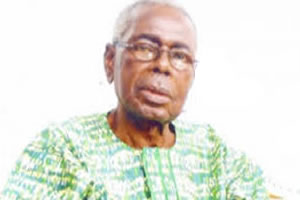|
||||||||||||||
|
||||||||||||||
Pa Odiase’s work became the second indigenous post-independence anthem in 1978 and remains the swan-song till date. The anthem is originally the fusion of the lyrics of five winning contestants, John Ikechukwu, Eme Etim Akpan, Babatunde Ogunnaike, Sotu Omoigui and P. O. Aderogbu in a national competition held for the purpose. As the Director of Music in the Nigeria Police Band at the time, Benedict Odiase creatively put the pieces together and was selected as the best composer. Pa Odiase should have been a public figure since 1978 when he achieved that feat; but like the first man in the moon, Neil Armstrong of the United States, he chose a humble, quiet life. Indeed he admitted his fears for publicity in his lifetime. After serving in the police meritoriously as Director of Music, among other notable positions, he retired in 1992 as a Deputy Commissioner of Police, still living reclusively in Oregun, Lagos without much recognition. When the nation turned 52 years old in 2012, however, the media fished him out and brought him once again to public glare. Some pertinent information about the anthem composer was revealed for the very first time during interviews he granted newsmen within the period. The public got to know, for instance, that he had ceded the copyright of his work (the anthem) to the Musical Copyrights Society Nigeria (MCSN) for safety purposes, a decision which, he claimed, was earning him regular royalties. Pa Odiase hailed from the former Bendel State, now split into Edo and Delta States of Nigeria. Born in 1935, he joined the Nigeria Police in March 1954 and served in the force based on instructions from the Police High Command. He was not commissioned by the Federal Government or any of its departments or agencies strictly for the purpose of writing and composing the anthem. When he sent in his entry for the competition in May 1978, it was open to all and sundry; and the police did not oppose his participation in his private capacity. The then Supreme Military Council (SMC) had sent all entries to the Federal Ministry of Information in Lagos, which did the shortlisting of only three best ones then announced by Mr. Christopher Oyesiku, the then leader of the choir of the Federal Radio Corporation of Nigeria (FRCN). The shortlisted entries were those of Professors Laz Ekwueme and Akin Euba of the University of Lagos, and that of Odiase. When his was announced as the best and used for the October 1, 1978 National Day, it attracted no immediate reward or commendation. But years later, in December 2001 to be precise, his reward came in the form of decoration as Member of the Order of the Niger (MON). From the humble story of Odiase, it can be deduced that reward for his patriotic contributions to the nation’s honour and pride came much later in his lifetime. What if he had died before 2001? It is, consequently, our candid opinion that Pa Odiase was not truly treasured or accorded the recognition he rightly deserved by the Nigerian government in his lifetime. The state and its actors are to a troubling extent notorious for neglecting citizens that have made contributions of iconic value to the nation. This is condemnable. Therefore, the passage of Odiase should serve as a catalyst for the change of government’s attitude towards its citizens, no matter how modest their patriotic contributions to national development may be. We also implore the powersthat- be, especially those foresworn to a do-or-die struggle for political power, to use the occasion of Pa Odiase’s death to reflect on the state of the nation and review positively their insensitive management of power to boost public motivation and enhance the survival of both the country’s fledgling democracy and the nation-state called Nigeria. In the meantime, we wish to acknowledge the immense contributions of the late Odiase to national honour and pride, and truly salute his heroic deeds. It is not too late, in any case. The federal and Edo State governments can still honour the fallen patriot even in death and through their contributions to the well-being of the family he left behind. Goodnight, Pa Odiase! Comment Box is loading comments...
|
||||||||||||||
|
| ||||||||||||||






